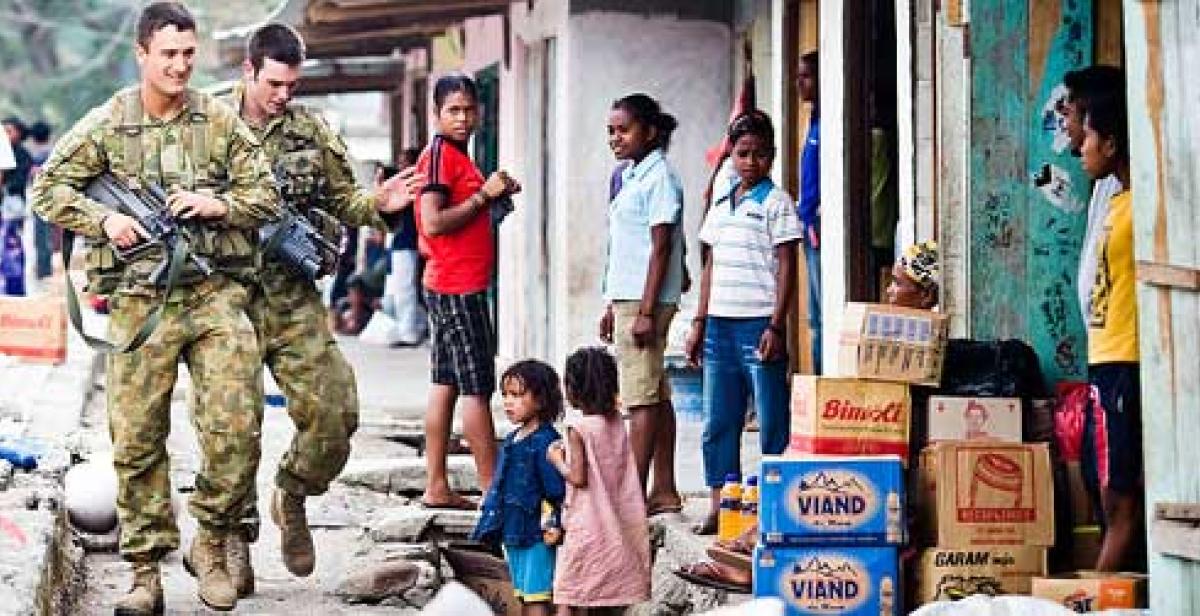A new book on Timor-Leste examines the way the country’s internal resistance combined with an international solidarity movement to achieve independence against all the odds. Progressio’s Steve Kibble asked the author, Dr Clinton Fernandes, about the Timorese war of independence from Indonesia, and what the future might hold for the Timorese people.
What made you write the book?
I was aware that many academics who write about East Timor (Timor-Leste) avoid serious discussion of the war of independence. But that’s where the modern East Timorese nation was born, and that’s where probably the largest loss of life relative to total population since the Holocaust occurred.
I also wanted to analyse how East Timor won its independence. The resistance did not have a land border with a friendly state. It had no external supplier of weapons and no liberated area in which to recover between guerrilla operations. This successful resistance is unique in the history of guerrilla warfare and independence struggles. I wanted to examine it.
What would you say is new or distinctive about your book?
Its choice of sources and its multi-dimensional approach.
First, the sources. History is a reconstruction of past events, and any reconstruction is a function of its sources. The book uses internal planning documents, intelligence records, personnel files, captured and leaked documents, and other direct evidence from government and private holdings.
These primary materials were produced at the time of the events to which they relate, and tend to be more reliable than materials that rely on uncorroborated memories and were produced much later. (Of course, primary materials have to be examined critically as to their authenticity, purpose and so on.)
For obvious reasons, people may provide the most self-serving explanations, justifications and excuses. Recently, I read a biography where about 75% of the sources were communications from the subject and his wife. This is not the way to learn about the world.
Second, the multi-dimensional approach. The war was fought in more than one dimension: not only in the mountains, towns and villages of East Timor, but also in the cities of Indonesia, at the United Nations, in a number of countries around the world, and in the international media. The weapons used were not just bullets but newspaper articles, public talks, films, texts and protests.
The book therefore focuses on the continuum of resistance between the armed freedom fighters in the mountains of East Timor, the clandestine resistance in the towns, and the international solidarity activists around the world. It treats East Timorese and international activists seriously. It shows how events in one conflict dimension affected events in others.
How important do you think the international solidarity movement (including churches) was?
It was decisive. Look at the South Moluccans, Acehnese and West Papuans [where independence movements have been hindered by a lack of strong international support].
What problems do you still foresee for Timor-Leste?
Those identified by East Timor’s finest think-tank, La’o Hamutuk. [La’o Hamutuk monitors government performance focusing among other things on issues of justice, democracy and corruption. Find out more at http://www.laohamutuk.org/]
How far are we from justice for Timorese people for what happened during the Indonesian occupation?
Impossible to say, since this depends on unpredictable factors such as motivation. The conditions for justice exist. But no international solidarity campaign can be stronger than the group it’s in solidarity with. And at the moment there isn’t enough organisational strength inside East Timor for justice. That may change, or it may not. It’s impossible to predict human factors such as motivation.
Do you see a new generation of Timorese leaders (with elections next year) dealing with problems of impunity and justice?
There are things they can do. Perhaps they feel there would be Indonesian retribution if they pursued justice directly and overtly. I doubt there would be any retribution beyond sulking and temper tantrums by a few backward chauvinists in Indonesia, but one cannot dismiss the concerns of East Timorese policymakers. After all, unlike foreign activists like me, they have to live in East Timor and face the consequences of their actions. They can’t disregard the circumstances in which they live.
That said, there are many things a future East Timorese government can do. They could repeatedly say “no comment” to questions about an international tribunal, and repeat it ad nauseum, all the while facilitating an extensive international inquiry into the thousands of disappeared persons. This would involve the International Committee of the Red Cross, international forensic experts, and so on. The matter would be highlighted and publicised, with the “no comment” position thus becoming an eloquent statement about how crimes against humanity are humanity’s responsibility. Everyone would understand that “no comment” would mean “Yes, certainly, but we don’t wish to be the only ones bearing the diplomatic burden”.
They could invite and support a team like the Argentinian/Australian International Forensic Team, which conducted a proactive investigation into the Santa Cruz massacre.
Just as RENETIL did in the war of independence, they could “Indonesianise” the campaign by educating Indonesian civil society about what occurred in East Timor.
The demographic facts of East Timor today mean that within a decade the majority of its citizens will have no memory of the Indonesian occupation, or the heroism of some of its people, or the names of the disappeared, or anything similar. An intensive education program in the schools will not only contribute to justice, but to the broader project of forging a nation, which means understanding themselves to be a political community with shared interests, worldviews, histories and so on.
There are many more things that could be done.
Dr Clinton Fernandes is an Associate Professor at the University of New South Wales.
The Independence of East Timor: Multi-Dimensional Perspectives – Occupation, Resistance, and International Political Activism is published by Sussex Academic Press.
Steve Kibble is a Progressio Policy and Advocacy Officer.
Photo: Peacekeeping soldiers on a street in Dili, the capital of Timor-Leste, in 2008. (Photo © Marcus Perkins/Progressio)



